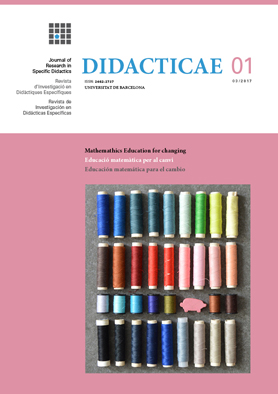Recontextualizaciones y ensamblajes: ABP y matemáticas universitarias
Recontextualizacions i acoblaments: ABP i matemàtiques universitàries
DOI:
https://doi.org/10.1344/did.2017.1.4-25Paraules clau:
aprenentatge basat en problemes, ABP, mediació tecnològica, modelacióResum
Un problema comú en l'aprenentatge de les matemàtiques universitàries és la bretxa entre el formalisme i l'abstracció i l'ús d'aquests en un context específic com és l'enginyeria. Les competències adquirides a través de l'aprenentatge basat en problemes (ABP) en el model pedagòric de la Universitat d'Aalborg a Dinamarca pot ensenyar com establir un pont per a tancar aquesta bretxa. A través de l'ànàlisi dels informes finals de semestre que realitzen estudiants de primer cicle d'enginyeria, on es recontextualitzen i s'acoblen en tractar problemes interdisciplinaris complexos, descrivim i analitzem les competències aconseguides pels estudiants quan reailtzen aquest tipus de projectes. Volem mostrar com l'activitat dels estudiants dins d'aquest ambient ofereix possibilitats d'aprenentatge que van més enllà de la clàssica distinció entre aprenentatge formal i l'aplicació de les matemàtiques.Referències
Abdulwahed, M., Jaworksi, B., y Crawford, A. R. (2012). Innovative approaches to teaching mathematics in higher education: A review and critique. Nordic Studies in Mathematics Education, 17(2), 49-68.
Barrows, H. S. (1986). A taxonomy of problem-based learning methods. Medical Education, 20(6), 481-486.
Beach, K. (1999). Consequential transitions: A sociocultural expedition beyond transfer in education. Review of Research in Education, 24, 101-139.
Bingolbali, E., y Monaghan, J. (2008). Cognition and institutional setting. En A. Watson y P. Winbourne (Eds.), New directions for situated cognition in mathematics education, Vol. 45, 233-259. Springer US.
Dahl, B., y Kolmos, A. (2015). Students’ attitudes towards group based project exams in two en-gineering programmes. Journal of Problem Based Learning in Higher Education, 3(2), 62-79.
Flyvbjerg, B. (2001). Making social science matter: why social inquiry fails and how it can succeed again. Oxford, UK; New York: Cambridge University Press.
Hernández, C., Ravn, O., y Valero, P. (2015). The Aalborg University PO-PBL model from a socio-cultural learning perspective. Journal of Problem Based Learning in Higher Education, 3(2), 16-36.
Knijnik, G. (2012). Differentially positioned language games: ethnomathematics from a philosophical perspective. Educational Studies in Mathematics, 80(1), 87-100.
Kolmos, A. (2008). Problem-based and project-based learning. En O. Skovsmose, P. Valero y O. R.Christensen (Eds.), University science and mathematics education in transition, 261-280.New York: Springer.
Kolmos, A., Fink, F. K., y Krogh, L. (2004). The Aalborg PBL model. Aalborg: Aalborg University Press.
Krogh, L., y Jensen, A. A. (Eds.). (2013). Visions, challenges and strategies: PBL principles and methodologies in a Danish and global perspective. Aalborg: Aalborg University Press.
Latour, B. (1994). On technical mediation. Philosophy, sociology, genealogy. Common Knowledge, 3(2), 29-64.
Lobato, J. (2006). Alternative perspectives on the transfer of learning: History, issues, and challenges for future research. Journal of the Learning Sciences, 15(4), 431-449.
Niss, M. (2002). University mathematics based on problem-oriented student projects: 25 years of experience with the Roskilde Model. En D. Holton, M. Artigue, U. Kirchgräber, J. Hillel, M. Niss y A. Schoenfeld (Eds.), The teaching and learning of mathematics at university level, Vol. 7, 153-165: Springer Netherlands.
Renshaw, E. (1991). Modelling biological populations in space and time. Cambridge; New York: Cambridge University Press.
Roth, W.-M. (2008). The gap between university and the workplace: Examples from graphing in science. En O. Skovsmose, P. Valero y O. R. Christensen (Eds.), University science and mathematics education in transition (p.133-155). New York: Springer.
Schoenfeld, A. H. (1992). Learning to think mathematically: Problem solving, metacognition, and sense making in mathematics. En D. A. Grouws (Ed.), Handbook of research on Mathematics teaching and learning (p. 334-369). New York: Macmillan.
VV.AA. (2005). Fugleinfluenza [Gripe aviaria]. Aalborg: Basisår. Det teknisk-naturvidenskabeligFakultet. Aalborg Universitet.
VV.AA. (2007). Rangordning af søgeresultater [Jerarquía de resultados de búsqueda]. Aalborg: Basisår. Det teknisk-naturvidenskabelig Fakultet. Aalborg Universitet.
Vithal, R., Christiansen, I. M., y Skovsmose, O. (1995). Project work in university mathematics education. A Danish experience: Aalborg University. Educational Studies in Mathematics 29(2), 1999-223.
Vithal, R., y Valero, P. (2003). Researching mathematics education in situations of social and political conflict. En A. Bishop, M. A. Clements, C. Keitel, J. Kilpatrick y F. K. S. Leung (Eds.), Second International Handbook of Mathematics Education (Vol. 2, p. 545-592. Dordrecht: Kluwer. Wittgenstein, L. (1997). Philosophical investigations. Oxford: Blackwell Publishers.
Descàrregues
Publicades
Número
Secció
Llicència
Drets d'autor (c) 2017 Paola Valero, Ole Ravn

Aquesta obra està sota una llicència internacional Creative Commons Reconeixement-CompartirIgual 4.0.
Els autors que publiquin en aquesta revista estan d'acord amb les següents condicions:
- Els autors conserven els drets d'autoria i otorguen a la revista el dret de primera publicació de l'obra.
- Els textos publicats a Didacticae estan sota una llicència de Reconeixement - Compartir igual 4.0 Espanya de Creative Commons.
- Per poder esmentar els treballs s'ha de citar la font (Didacticae) i l'autor del text.
- Didacticae no accepta cap responsabilitat pels punts de vista i les declaracions fetes pels autors en els seus treballs.



